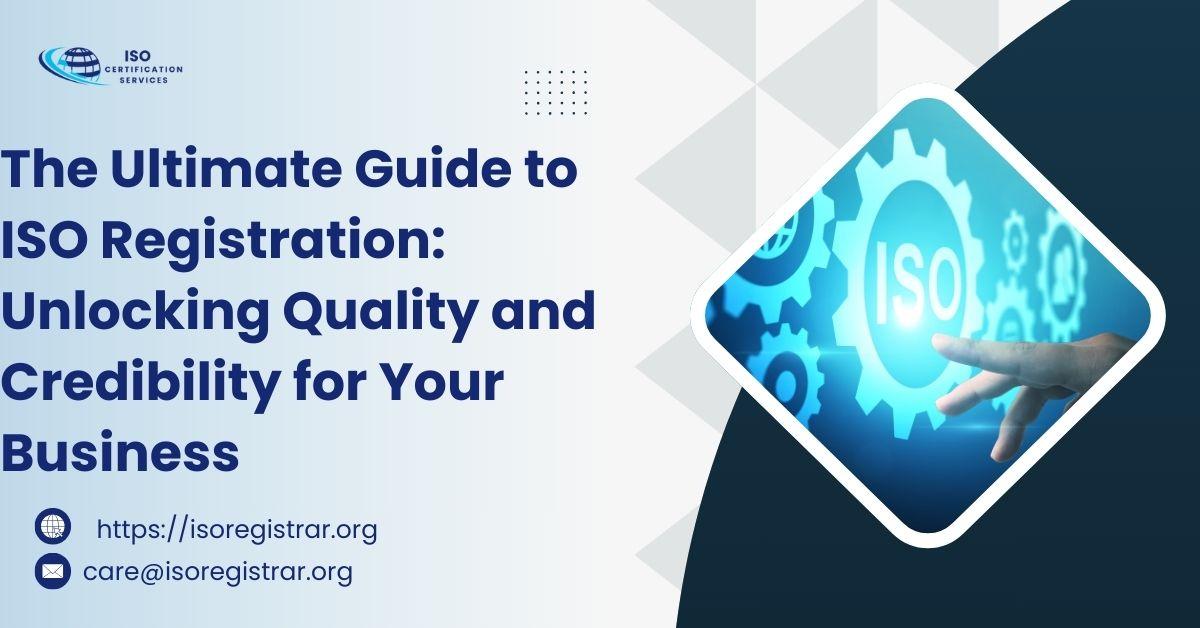The Ultimate Guide to ISO Registration: Unlocking Quality and Credibility for Your Business

In today's highly competitive market, standing out requires more than just a great product or service. Businesses must prove their commitment to quality, consistency, and customer satisfaction. One of the most effective ways to achieve this is through ISO Registration. But what exactly is ISO, why is it important, and how can you register your business to enhance your credibility? In this comprehensive guide, we will explain everything you need to know about ISO registration, step by step.
What is ISO Certification and Why Should Your Business Care?
ISO stands for the International Organization for Standardization, an independent body that develops and publishes international standards for various industries. ISO standards ensure that products and services are safe, reliable, and of good quality. An ISO Certification is a stamp of approval that your business adheres to these internationally recognized standards.
For businesses, getting ISO certified can:
-
Improve product quality
-
Increase customer trust
-
Open up new business opportunities
-
Enhance market reputation
ISO certification is recognized worldwide and demonstrates your commitment to maintaining high standards of quality and service. Whether you're a small business or a large corporation, ISO registration can provide you with a competitive edge in the market.
Types of ISO Certifications: Which One is Right for Your Business?
ISO standards cover a wide range of areas, and your business might need certification in one or more of these areas. Here are some of the most common types of ISO certifications:
-
ISO 9001 – Quality Management: This is the most popular ISO certification and is focused on ensuring that your business maintains consistent quality in products or services. ISO 9001 is suitable for businesses in all sectors and ensures that your processes are efficient, customer-focused, and continually improving.
-
ISO 14001 – Environmental Management: ISO 14001 focuses on environmental management systems. This certification helps businesses manage their environmental impact and reduce waste and energy usage. It’s ideal for businesses that want to demonstrate a commitment to sustainability.
-
ISO 45001 – Occupational Health and Safety: ISO 45001 focuses on creating a safe working environment for employees by reducing risks and ensuring workplace safety. This certification is ideal for businesses that prioritize employee health and safety.
-
ISO 27001 – Information Security Management: For businesses that handle sensitive information, ISO 27001 certification ensures that your information security management system is robust and meets international standards for safeguarding data.
-
ISO 22000 – Food Safety Management: This certification is crucial for businesses in the food industry, ensuring that food safety processes are in place to prevent contamination and guarantee the safety of food products.
-
ISO 50001 – Energy Management: ISO 50001 helps businesses develop a system for managing and improving energy performance. It’s particularly valuable for organizations looking to reduce energy consumption and costs.
-
ISO 13485 – Medical Devices: This certification is specific to the medical device industry, ensuring that products are manufactured in a controlled environment with the highest quality standards.
Step-by-Step Process for ISO Registration
Now that we know what ISO certification is and why it's beneficial, let’s look at how you can get your business ISO registered. The process might seem overwhelming, but we’ll break it down into simple steps to make it more manageable.
Choose the Right ISO Standard: Select the ISO standard that fits your business needs and aligns with your goals.
Visit the Certification Portal: Go to the official ISO certification website.
Fill Out the Application Form: Complete the online form, ensuring all details are accurate.
Submit Your Application: Review, submit, and double-check all details.
Payment: After submitting the form, pay the nominal charges.
Certificate Confirmation: A consultant confirms the ISO standard you're applying for.
Receive Your ISO Certificate: Once it’s approved, your ISO certificate will be sent to your registered email.
Benefits of ISO Registration for Your Business
The process of getting ISO certified requires time, effort, and resources, but the benefits make it all worth it. Here’s how ISO certification can benefit your business:
-
Increased Customer Trust: ISO certification is widely recognized, and customers are more likely to trust businesses that have been certified to international standards. It shows your commitment to delivering high-quality products or services.
-
Market Differentiation: In competitive markets, ISO certification can help your business stand out. It signals to customers that you follow best practices and are committed to continuous improvement.
-
Operational Efficiency: The process of achieving ISO certification helps streamline your business operations by introducing systematic processes, reducing inefficiencies, and ensuring consistent quality.
-
New Business Opportunities: Many large organizations and government agencies require ISO certification before they can work with you. Achieving ISO registration opens up new procurement opportunities and business relationships.
-
Enhanced Employee Morale: Implementing ISO standards often leads to better workplace practices, clearer roles, and responsibilities, which can boost employee morale and productivity.
NOTE:- Apply for ISO CERTIFICATION 9001 : 2015
Conclusion
ISO registration is a powerful tool for businesses that want to demonstrate their commitment to quality, customer satisfaction, and continuous improvement. While the process of getting ISO certified requires effort, it offers valuable benefits, including improved reputation, customer trust, and market access.
Whether you’re a small business or a large corporation, ISO certification is an investment that can help you stand out in a crowded marketplace, enhance operational efficiency, and drive long-term success. By following the steps outlined in this guide, you can begin your journey toward ISO registration and unlock the many opportunities it offers for growth and success.
- Art
- Causes
- Crafts
- Dance
- Drinks
- Film
- Fitness
- Food
- Jogos
- Gardening
- Health
- Início
- Literature
- Music
- Networking
- Outro
- Party
- Religion
- Shopping
- Sports
- Theater
- Wellness


